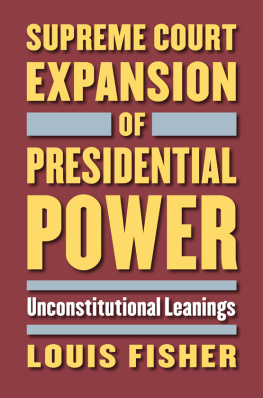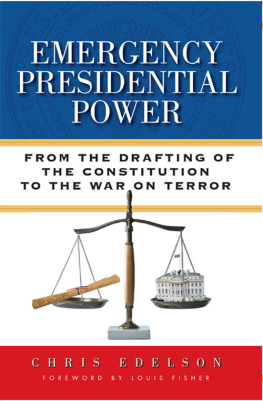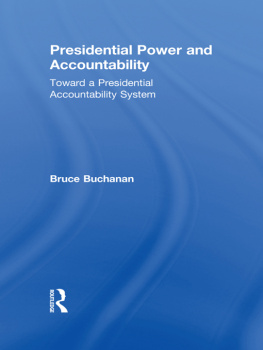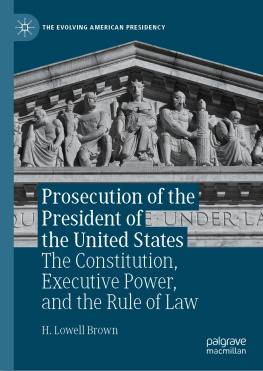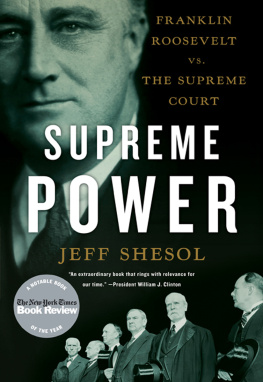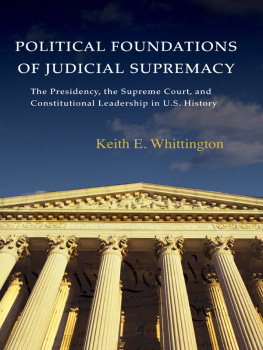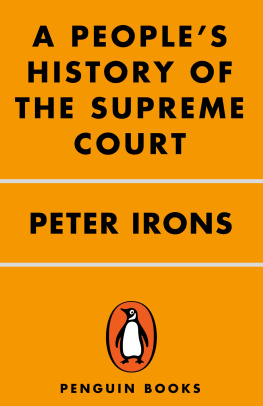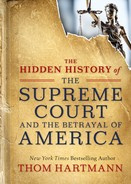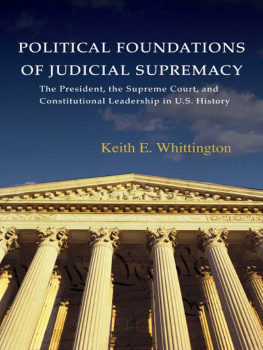SUPREME COURT EXPANSION
OF PRESIDENTIAL POWER
By the Same Author
Congress: Protecting Individual Rights (2016)
American Constitutional Law (with Katy J. Harriger, 11th ed., 2016)
The Democratic Constitution (with Neal Devins, 2d ed., 2015)
The Law of the Executive Branch: Presidential Power (cloth ed., 2014; paper ed., 2015)
Constitutional Conflicts bet ween Congress and the President (6th ed., 2014)
On the Supreme Court: Without Illusion and Idolatry (2014)
Presidential War Power (3d ed., 2013)
Defending Congress and the Constitution (2011)
Political Dynamics of Constitutional Law (with Neal Devins, 5th ed., 2011)
On Appreciating Congress: The Peoples Branch (2010)
The Supreme Court and Congress: Rival Interpretations (2009)
The Constitution and 9/11: Recurring Threats to Americas Freedoms (2008)
In the Name of National Security: Unchecked Power and the Reynolds Case (2006)
Military Tribunals and Presidential Power: American Revolution to the War on Terrorism (2005)
The Politics of Executive Privilege (2004)
Nazi Saboteurs on Trial: A Military Tribunal and American Law (2003)
Religious Liberty in America: Political Safeguards (2002)
Congressional Abdication on War and Spending (2000)
The Politics of Shared Power: Congress and the Executive (4th ed., 1994)
Encyclopedia of the American Presidency (with Leonard W. Levy, 1994)
Constitutional Dialogues: Interpretation as Political Process (1988)
The Constitution between Friends: Congress, the President, and the Law (1978)
Presidential Spending Power (1975)
President and Congress: Power and Policy (1972)
SUPREME COURT EXPANSION OF PRESIDENTIAL POWER
Unconstitutional Leanings
Louis Fisher
UNIVERSITY PRESS OF KANSAS
2017 by the University Press of Kansas
All rights reserved
Published by the University Press of Kansas (Lawrence, Kansas 66045), which was organized by the Kansas Board of Regents and is operated and funded by Emporia State University, Fort Hays State University, Kansas State University, Pittsburg State University, the University of Kansas, and Wichita State University
Library of Congress Cataloging-in-Publication Data
Names: Fisher, Louis, author.
Title: Supreme Court expansion of presidential power : unconstitutional leanings / Louis Fisher.
Description: Lawrence, Kansas : University Press of Kansas, 2017. | Includes index.
Identifiers: LCCN 2017020134
ISBN 9780700624676 (hardback)
ISBN 9780700624683 (ebook)
Subjects: LCSH: Executive powerUnited StatesHistory. | PresidentsUnited States. | Constitutional lawUnited States. | United States. Supreme Court. | Political questions and judicial powerUnited States. | United StatesPolitics and government. | United States. Supreme Court. | BISAC: POLITICAL SCIENCE / Constitutions. | POLITICAL SCIENCE / Government / Executive Branch. | POLITICAL SCIENCE / Government / Judicial Branch.
Classification: LCC KF5053 .F59 2017 | DDC 342.73/062dc23
LC record available at https://lccn.loc.gov/2017020134.
British Library Cataloguing-in-Publication Data is available.
Printed in the United States of America
10987654321
The paper used in this publication is recycled and contains 30 percent postconsumer waste. It is acid free and meets the minimum requirements of the American National Standard for Permanence of Paper for Printed Library Materials Z39.48-1992.
To Justice Robert Jackson, who wrote in the Steel Seizure Case: With all its defects, delays and inconveniences, men have discovered no technique for long preserving free government except that the Executive be under the law, and that the law be made by parliamentary deliberations.
CONTENTS
PREFACE
This book analyzes the extent to which the Supreme Court has expanded presidential authority beyond constitutional boundaries. On some issues, such as the decision in 2014 against recess appointments by President Obama, the Court not only checks executive power but does so unanimously. Where judicial support for independent presidential authority has been particularly noticeable is in the field of external affairs, including the war power, treaty negotiation and termination, the state secrets privilege, the power to recognize foreign governments, and the broad area of national security policy.
The Courts advocacy of independent presidential power in external affairs rests not on the constitutional text and the Framers intent but on plainly erroneous dicta and personal views by Justices that American safety is enhanced by trusting in presidential actions abroad. The record offers no evidence to support that confidence. The Courts record in support of presidential power has been especially strong from 1936 to the present time. No such preferential pattern exists for judicial rulings favoring congressional authority. As a result, the Court weakens the constitutional system of checks and balances and puts at risk the rights of individuals and groups affected by presidential initiatives.
This pattern of judicial rulings has been recognized by scholars for a number of decades. A book by Harold Koh in 1990 concluded that after the Vietnam War, the Supreme Court has intervened consistently across the spectrum of United States foreign policy interests to tip the balance of foreign-policy-making power in favor of the president.
My book studies the judicial record from 1789 to the present. For nearly a century and a half, the Supreme Court did not indicate a preference for which of the two elected branches should dominate in the field of external affairs. However, from the 1936 decision in Curtiss-Wright forward, the pattern is quite clear that the Court regularly offers support for independent presidential power in times of emergency, or what the Court generally calls issues of national security. The damage this has done to democracy and constitutional government is profound and requires close analysis.
To fully appreciate the Courts understanding of presidential power, it is necessary to study not merely cases that specifically address external affairs. Attention is also needed on issues of domestic policy, including impoundment of funds, legislative vetoes, item-veto authority, the issue of presidential immunity in the Paula Jones case, recess appointments, and immigration initiatives by the Obama administration. In these cases, federal courts have often pushed back against claims of independent presidential power.
I have written about these issues for many decades, including articles explaining the judicial error included in Curtiss-Wright about the sole organ doctrine. After noticing that the D.C. Circuit in 2013 relied five times on that doctrine in upholding presidential power in Zivotofsky v. Secretary of State, I filed an amicus brief with the Supreme Court on July 17, 2014, setting forth in detail why the doctrine is a plain misconception and asking the Court to correct the error. The Court did so a year later, in Zivotofsky v. Kerry, but chose to uphold presidential power by reiterating other erroneous dicta from Curtiss-Wright and creating a new judicial model that is close cousin to the sole-organ doctrine. Those issues are addressed in of this book.
Chuck Myers of the University Press of Kansas provided excellent guidance on the general theme of the book and individual chapters. I benefited from two outside reviewers who read the book closely: Mitchel Sollenberger of the University of Michigan at Dearborn, and Richard Pious, professor emeritus at Barnard College. A number of colleagues and friends offered important suggestions, including the particular cases that have defined and enlarged presidential power from 1936 to the present time. My thanks for valued and insightful recommendations by Dave Adler, Reb Brownell, Henry Cohen, Jeff Crouch, John Denvir, Neal Devins, Mary Dudziak, Chris Edelson, John Elliff, Jenny Elsea, Jasmine Farrier, Bruce Fein, Herb Fenster, Mike Glennon, Katy Harriger, Gene Healy, Loch Johnson, Nancy Kassop, Jim Pfiffner, Dick Pious, Chris Pyle, Harold Relyea, Taylor Reveley, Mort Rosenberg, Mark Rozell, Andy Rudalevige, Charlie Savage, Peter Shane, Mitch Sollenberger, Ilya Somin, Bob Spitzer, and Charles Tiefer.

